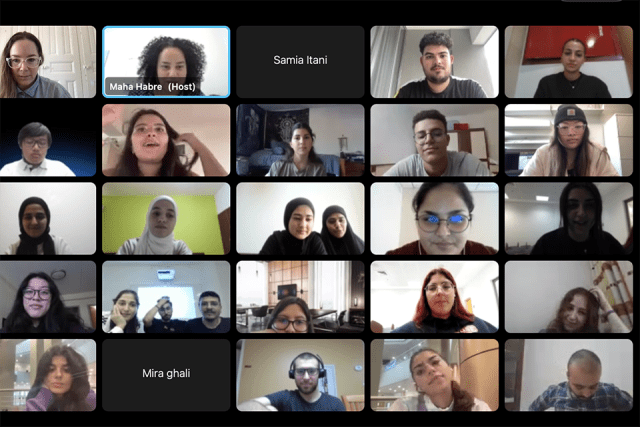By Alana Lee Glaser, Ph.D., Assistant Professor of Anthropology, Department of Sociology and Anthropology

GOLE collaboration between students from St. John’s and the Lebanese American University.
I partnered with Maha Habre, D.N.P., R.N., a nursing professor at the Lebanese American University, to teach a GOLE (Global Online Learning Exchange) project for my Anthropology of Pandemics and Health, Food, and Environments courses in the Fall of 2023. Dr. Habre’s expertise in culturally congruent health-care delivery and interprofessional education overlapped with my own research background in medical anthropology, as well as my recent ethnographic focus on US nursing care before and during the COVID-19 epidemic.
Through our scholarly collaboration, I benefited immensely on a personal and professional level. And, more critically, our students gained invaluable, once-in-a-lifetime experience in intercultural exchange.
Together, Dr. Habre and I designed a five-week collaborative project for our students to illustrate the cultural nuances embedded in issues of public health, safety, care, and bioethics. Students joined cross-disciplinary, international groups to debate complex issues relevant to nursing as well as social science students. Debate topics included disaster preparedness, diagnostic disclosure, appropriate pandemic response, racial health disparities, abortion access, public health measures, and incorporation of artificial intelligence in health-care settings.
Supported by course readings on both our subject matter and principles of intercultural exchange, students researched and wrote their debate scripts, managing the logistics of communicating across time-zone, language, culture, and disciplinary background. These exchanges challenged students to consider their own communication styles and learning approaches in their intercultural debate groups, where issues of etiquette, conscientiousness, and reliability emerged.
Additionally, through exploration of debate topics, they gained a sense of how politics, culture, and economy can shape ethical norms, while their own shared experiences as students also gave them a sense of commonality across time, distance, and other differences. For St. John’s students, I partnered with University Career Services to ensure that they practiced how best to describe and market their new intercultural competencies—powerful tools in the job market and on graduate applications.
Halfway through our collaboration, our Lebanese partners’ university temporarily closed due to Israel Defense Forces’ aerial attacks along the southern border and ongoing risks to civilians posed by the intensification of the Hezbollah-Israel conflict following October 7, 2023. I learned from my students that many of their Lebanese partners had family in Gaza, as well as in West Bank, while others were Palestinian refugees, whose families migrated to Lebanon following the 1948 Palestine War.
I find it difficult to reflect on this aspect of the collaboration. St. John’s students shared with me that these partnerships deepened their empathy and critical engagement with the region. Yet, counting any consequence of war—particularly one in which the death toll is approaching 40,000 inside seven months—as an educational benefit is simply too gruesome and callous to bear.
Nonetheless, it was an undeniable gift that I had the chance to collaborate with Dr. Habre and that our students had the occasion to team up and learn from one another; it is a gift I hope to reciprocate during future collaborations. Many of our students’ WhatsApp-enabled friendships continue these many months later.
Related News
Entangled Across Borders: Celebrating 100 Years of Quantum Physics Through a Global Classroom
In Spring 2025, I implemented the first iteration of the Global Online Learning Exchange (GOLE) in my Scientific Inquiry class at St. John’s University, a core class focused on how scientists make...
Grazie, Papa Francesco: Notes on the Passing of Pope Francis
Loreal is a junior at St. John’s University majoring in International Management with a minor in Social Justice : Theory and Practice in the Vincentian Tradition . She is also the President of the...
Snapshots: New Students from Around the World
The St. John’s community specializes in being a welcoming, friendly, accepting place and so we are excited to introduce you to some of our new international students. We hope these students will...
